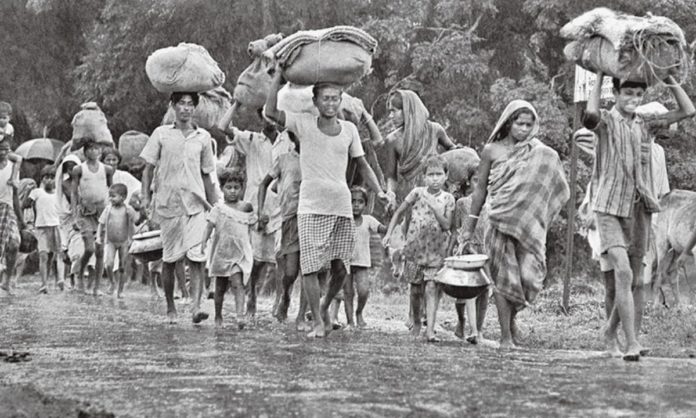CHATTOGRAM, Mar 28, 2019 (BSS) -The people of Chattogram witnessed the first grisly genocide here on this day of fiery March in 1971 at city’s Maddhyam Nath Para, Halishahar, a small hamlet of low caste Hindu community.
The blood hungry butchers belonging to the Bihari community killed 79 Bengalees with axes, spades, knives and other lethal weapons in their rampage for few hours.
Among the 79 martyrs, 40 were jawans of the then East Pakistan Rifles (EPR) and 39 were local people, said relatives of the victims.
Pijush Nath, son of Martyr Anil Bihari Nath, said the EPR members of Halishahar camp, led by the then Major Rafique put up strong resistance against the Pakistani military junta on the black night of March 25 in 1971 when Bengalee civilians of South Halishahar cooperated with the EPR jawans, infuriating the Pakistani occupation forces.
On March 29, Pakistan army advanced to the EPR camp in South Kattali in the city. On the following day they cordoned off the Gohona channel on the north of the city and the adjacent areas of the EPR camp on the southern parts of the city.
The EPR jawans with meager stock of arms and ammunition did not find it levelheaded to face the Pakistan army. After a brief resistance they withdrew but 40 of them took shelters at different houses of Maddhyam Nath Para.
The local Biharis started genocide at noon on March 31. After the frantic search of all the houses they murdered the young Bengalees one after another and later torched their houses that still haunt the horrific and traumatic incident of carnage in the minds of survivors, Pijush Nath added.
One of the witnesses of the horrifying incident was Khuki Devi, the younger sister of martyr Dulal Nath, who was then a student of Chattogram Commerce College.
Khuki said in the morning of the fateful day, a band of 10-12 EPR jawans took shelter in their house.
“My father and brothers provided them clothes and food. After changing clothes and taking food they left our house,” she said adding “at noon, a group of Biharis raided our house with sharp weapons and searched for the EPR jawans.”
“Seeing my two brothers inside the house, the butchers instantly hacked them to death with axe. My mother, Nirubala got fainted watching the dreadful scene. They also killed my father and grandfather,” she added.
Khuki Devi said, the killers dragged out the bodies and threw those on my senseless mother and said – “take bath with your sons blood.”
“The body of my mother was getting wet with the bloods of her sons,” Khuki Devi said in a choked voice, who was able to hide herself under a couch but she sustained burn injuries in her left leg and arm as the blood thirsty monsters set the house on fire.
Mrinal Nath, another son of Nirubala, who survived the killing, said, “I don’t want any grants or sympathy for my slain grandfather, father and two elder brothers, I just demand the government hand down proper punishment to the accomplice of Pakistani butchers”.
Maddhyam Nath Para, one of the posh residential area of the port city, has now developed with many sky touching high rise buildings, and the memories of the gruesome killings in 1971 were faded and smothered under the countless bricks and concrete.
However, as a mark of highest and supreme sacrifice of the martyrs a memorial was built there a few years back with the initiative of a group of freedom fighters comprised of researcher on Liberation War Dr. Mahfuzur Rahman, cultural leader Prodeep Dewanji, journalist Nasir Uddin Chowdhury, writer Sakhawat Hossain Majnu, architect Dhali Al Mamun



